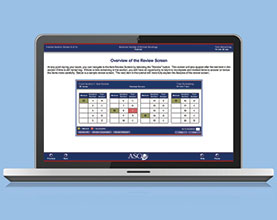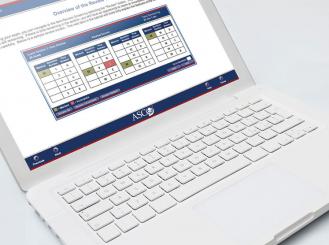Apr 22, 2014
By Steven J. Cohen, MD
In 2008, ASCO debuted the Medical Oncology In-Training Exam (ITE) “as a tool to assess trainees’ knowledge of the clinical oncology subspecialty, establish consistency in educational standards across training programs, identify areas of strength and weakness in individual programs, and stimulate intra-programmatic reading and discussion.” Each year, a group of program directors and other disease-specific experts design the upcoming year’s exam by reviewing the existing test question bank, updating content, and writing new questions to reflect emerging data.
While the overarching goal of the ITE is to provide feedback and education to fellows and program directors, the process of test-taking and receiving scores can create significant anxiety among trainees. However, understanding these score reports is the first step in overcoming the anxiety and making the most of the ITE.
What does the report actually include and what should you review?
Each fellow receives a scaled score, which is a composite score for their performance on the entire exam. This is not meant to equate to a “grade,” but rather to give the fellow a general sense of their standing among other test takers. An accompanying table puts that scaled score into context, giving each scaled score a percentile rank by year of fellowship. While this score is naturally the number most focused upon, it provides the least feedback regarding topics and subject matter. However, it is a barometer of each fellow’s performance relative to trainees at their level. What I tell my first-year fellows is that I want to see this number increase across their three years. Second-year fellows should see an improvement from first year. Depending on the structure of each program, scores may not necessarily change significantly between second and third year, particularly for fellows at the higher end of the scale.
An important aspect of the score report is the breakdown by content area. Each fellow receives a report of percentage of questions he/she answered correctly in each topic compared to a comparable group of test takers in their training year. This allows fellows to assess performance in each content area and identify areas in which they are solid and those in which they need additional attention. It is a nice opportunity for fellows to compare topic performance with exposure during fellowship. For example, a fellow who has primarily rotated on bone marrow transplant and malignant hematology during the beginning of fellowship would expect a higher score in this area than in gastrointestinal (GI) malignancies.
When I review reports with my fellows, I like to match up their performance in each content area with their clinical exposure to date. A first-year fellow who scores low in genitourinary (GU) malignancies but hasn’t rotated through this clinic yet generates less worry than a third-year with the identical score who has spent six months in GU clinic. The final portion of the score report has educational objectives that correspond to incorrectly answered questions. While the list can be daunting to review completely, general subject matters requiring additional study can be identified. The Test Materials Development Committee has worked hard to walk a fine line between identifying areas for further study and “giving away” the actual questions, as the question bank can be utilized for future exams. However, the objectives have become more detailed over time and afford an opportunity for fellows to review and assess topics requiring additional study, even within topic categories in which they scored well.
 |
What should you do with the results?
A key point is that the results should not be punitive. They should not be used to determine promotion or successful program completion. However, it is critical that trainees discuss the results with their program director for guidance in interpretation and the implications for future clinical training and study. The exam is administered each February with results available by spring. Thus, the six-month and end-of-year review meeting with your program director offers an ideal forum to discuss and dissect exam results.
In my meetings, I tend to focus on score trend over time (for second- and third-year fellows) and specific topic performance for all fellows. If trainees have scored poorly in a discipline for which they have had limited exposure, we discuss how they can get additional exposure in that disease. For first-year fellows, this may simply reflect the structure of the program. For second-year fellows, focused rotations may be in order during third year. If trainees have scored poorly in a discipline for which they have had exposure, it is important to discuss with their program director whether additional exposure would be helpful or whether structured reading would be of greater benefit.
Using the results to focus independent study
Particularly for third-year fellows, the ITE offers a nice “warm-up” for the American Board of Internal Medicine medical oncology certification exam. Although the tests are written independently, the broad subject matter is similar. Third-year fellows can use the results to assess particular areas that require additional focus, either in the form of a board review course or individual study.
All fellows can benefit from independent study in topic areas that need improvement. While programs provide clinical training and didactic forums, there is no substitute for independent study and reading. The electronic era has created an ability to come up with “an answer” for how to treat a patient with a few clicks of the keypad (National Comprehensive Cancer Network guidelines, UpToDate, etc.). However, excelling on the ITE, the boards, and, most importantly, in patient care requires an understanding of the literature behind those decisions. Perhaps I am “old school,” but I tell my fellows to take subject matters they need improvement in and go to the corresponding educational objective in their report. If the treatment of stage III colon cancer is the problem (and I can’t imagine that happening with a GI oncologist as their program director!), I encourage them to pick out a recent review on the topic, read it, and then pull all the key papers and actually read them! Knowing that “FOLFOX” is the answer is one thing. But what as the magnitude of benefit? Was it present for stage II? And so on... you get the idea. You can only learn from reading. My fellows have also found the ASCO-SEP series to be helpful for focusing their independent study and test-taking skills.
Summary
A fellow’s “score” on the ITE is actually the least important aspect of the test. How one can identify areas for improvement and focus on self-study is critical. Review carefully with your program director. We want you to succeed and can help to guide learning and rotations based on test results. Most importantly, keep reading. Good luck!


